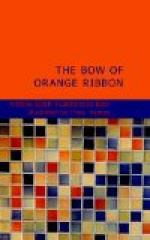“I remember. Two went to the Virginia Colony”—
“To Norfolk,—tobacco brokers, and making money. My son Alexander—a wise lad—went to Boston, and is in the African trade. I may say that they are all honest, pious men, without wishing to be martyrs for honesty and piety, which, indeed, in these days is mercifully not called for. As for Neil, he’s our last bairn; and his mother and I would fain keep him near us. Katherine would be a welcome daughter to our auld age, and weel loved, and much made o’; and I hope baith Madam Van Heemskirk and yoursel’ will think with us.”
“We have said we would like the marriage. It is the truth. But, look now, Katherine shall not come any more to your house at this time, not while English soldiers come and go there; for I will not have her speak to one: they are no good for us.”
“That is right for you, but not for me. My wife was a Gordon, and we couldn’t but offer our house to a cousin in a strange country. And you’ll find few better men than Col. Nigel Gordon; as for his wife, she’s a fine English leddy, and I hae little knowledge anent such women. But a Scot canna kithe a kindness; if I gie Colonel Gordon a share o’ my house, I must e’en show a sort o’ hospitality to his friends and visitors. And the colonel’s wife is much thought o’, in the regiment and oot o’ it. She has a sight o’ vera good company,—young officers and bonnie leddies, and some o’ the vera best o’ our ain people.”
“There it is. I want not my daughters to learn new ways. There are the Van Voorts: they began to dine and dance at the governor’s house, and then they went to the English Church.”
“They were Lutherans to begin wi’, Joris.”
“My Lysbet is the finest lady in the whole land: let her daughters walk in her steps. That is what I want. But Neil can come here; I will make him welcome, and a good girl is to be courted on her father’s hearth. Now, there is enough said, and also there is some one coming.”
“It will be Neil and Bram;” and, as the words were spoken, the young men entered.
[Illustration: Neil and Bram]
“Again you are late, Bram;” and the father looked curiously in his son’s face. It was like looking back upon his own youth; for Bram Van Heemskirk had all the physical traits of his father, his great size, his commanding presence and winning address, his large eyes, his deep, sonorous voice and slow speech. He was well dressed in light-coloured broadcloth; but Neil Semple wore a coat and breeches of black velvet, with a long satin vest, and fine small ruffles. He was tall and swarthy, and had a pointed, rather sombre face. Without speaking much in the way of conversation, he left an impression always of intellectual adroitness,—a young man of whom people expected a successful career.




